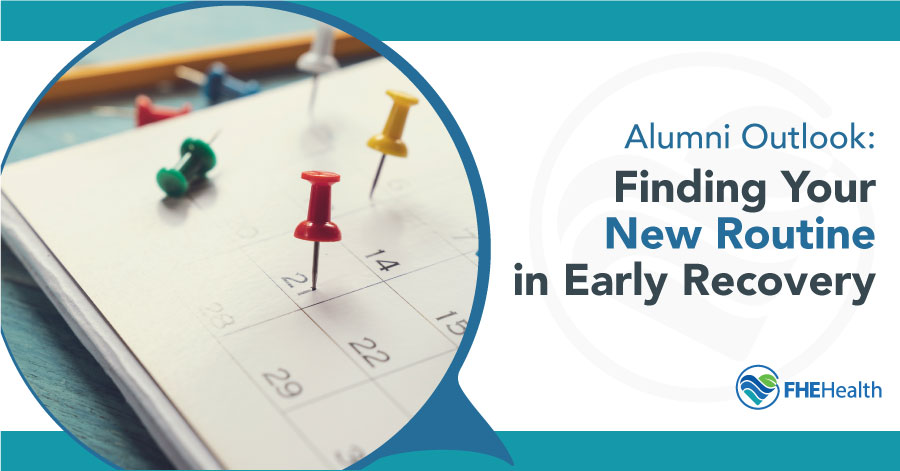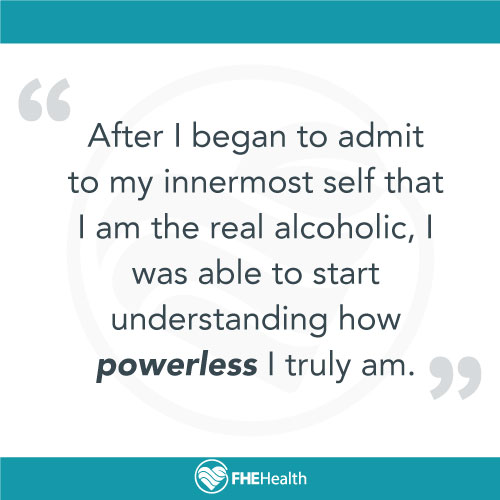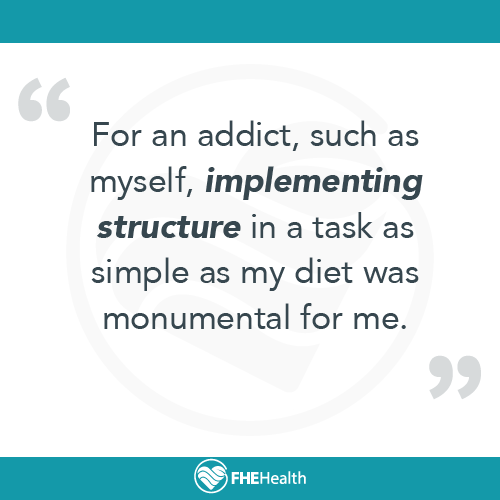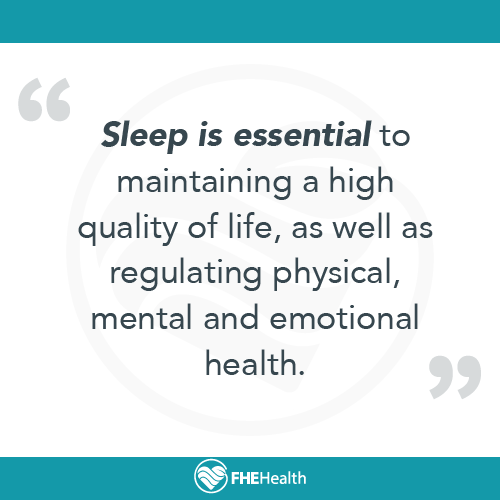
Before venturing down the road to recovery, my daily routine consisted of one primary focus: consuming the next drink. I was submissive to one master, and I had no real sense of stability, discipline or structure. My drinking and drugging led to a life filled with chaos and no real sense of identity.
Fortunately, my addiction beat me into a state of utter submission. It wasn’t long before I educated myself on the disease of addiction and the vital importance of being willing to abandon myself entirely to a new way of living. You see, self-medicating was my solution for a long time — until I could no longer satisfy the gaping hole within myself with drugs and alcohol. I learned to follow a new daily schedule for recovering addicts.
The Importance of a Daily Schedule for Recovering Addicts
 Abstinent from other mood/mind-altering substances, I began to truly understand the stark nature of my disease. My life was undoubtedly unmanageable while I was abusing drugs and alcohol, but my life didn’t become entirely manageable once I got sober. This is still one of the most important factors I must keep in the forefront of my mind, even today. I had no idea how to live a balanced or disciplined life. I had no idea how to live life as a functioning, respectful and productive member of society.
Abstinent from other mood/mind-altering substances, I began to truly understand the stark nature of my disease. My life was undoubtedly unmanageable while I was abusing drugs and alcohol, but my life didn’t become entirely manageable once I got sober. This is still one of the most important factors I must keep in the forefront of my mind, even today. I had no idea how to live a balanced or disciplined life. I had no idea how to live life as a functioning, respectful and productive member of society.
After I began to admit to my innermost self that I’m the real alcoholic, I was able to start understanding how powerless I truly am. I came into the rooms of recovery and saw many people with substantial sobriety live prosperous and fulfilling lives. I felt like these people were experiencing the promises of a sober life, but I would never quite measure up. It wasn’t until I started taking a look within myself, implementing discipline and indulging in new hobbies that I truly began experiencing the freedom of recovery.
Start Small
Making too many changes at once can often sabotage recovery efforts. Instead, I had to focus on small changes to give myself time to adjust. For example, focus on one area of your life at a time. Eat right and add a walk after dinner, or commit to reading one book a week. Get up 15 minutes earlier each day to ensure you’re on time for commitments, or vow to always make your bed each morning. Change the route you drive to work to avoid an old favorite liquor store. You’re more likely to stick to changes when you do them one at a time or create small goals for yourself. Be open to additional changes as you continue along the path to recovery.
Nutrition: You Are What You Eat
 First and foremost, it was so important for me to prioritize a healthy diet in recovery. While I was in treatment, I gained a healthy 20 pounds. This was not a difficult task with an on-site chef doing all the cooking. However, I was put to the test when I was left to cook for myself. Studies in depression, nutrition and mental illness have proven that nutritional deficiencies can play a direct role in the onset of depression. Individuals who received 0.8mg of folic acid or 0.4mg of vitamin B12 had fewer symptoms of depression.
First and foremost, it was so important for me to prioritize a healthy diet in recovery. While I was in treatment, I gained a healthy 20 pounds. This was not a difficult task with an on-site chef doing all the cooking. However, I was put to the test when I was left to cook for myself. Studies in depression, nutrition and mental illness have proven that nutritional deficiencies can play a direct role in the onset of depression. Individuals who received 0.8mg of folic acid or 0.4mg of vitamin B12 had fewer symptoms of depression.
For an addict such as myself, implementing structure in a task as simple as my diet was monumental for me. After all, our food is the fuel for our bodies. I began to create a weekly meal plan and committed to maintaining a healthy weight and taking care of myself entirely. Recovery daily is all about balance and taking care of the mind, body and soul.
Make Exercise Part of Your Day
Research shows just 30 minutes of exercise a day is enough to release endorphins, which create feelings of happiness and euphoria. Exercise can also relieve stress, reduce pain and inflammation and increase your overall physical wellness. All of these are helpful during the recovery process. Choose something you enjoy and commit to it at least 5 days a week for optimal results.
Sleep Is Not for the Weak
 During the many years of my ravishing addiction, I lived by the mantra, “I’ll sleep when I’m dead.” Back then, I was malnourished, sleep-deprived and certifiably insane. Sleep deprivation is directly correlated with high blood pressure, kidney disease, depression, stroke and many other chronic health issues. Sleep is essential to maintaining a high quality of life, as well as regulating physical, mental and emotional health.
During the many years of my ravishing addiction, I lived by the mantra, “I’ll sleep when I’m dead.” Back then, I was malnourished, sleep-deprived and certifiably insane. Sleep deprivation is directly correlated with high blood pressure, kidney disease, depression, stroke and many other chronic health issues. Sleep is essential to maintaining a high quality of life, as well as regulating physical, mental and emotional health.
Implementing a responsible bedtime was crucial to my overall mental well-being and part of a simple daily routine. Before bed, I made it a priority to spend some quiet time reviewing my day, taking inventory and meditating. Immediately, I began to notice a shift in my quality of sleep, as well as my overall emotional state in the morning. I was no longer dreading waking up in the morning, and the irritability, discontentment and restlessness continued to slip away.
Meditation: Quieting the Static Noise
Before ever picking up a drink or a drug, I would describe a consistent static sound flooding my head at all times. Once I consumed my first sip of alcohol, the noise was immediately silenced. When I first got sober, I can remember the sound returning. My head was flooded with racing thoughts and anxieties, and I had no idea how to silence the noise without the aid of another substance.
I heard many people talk about meditation, and instantly I’d picture Buddha in the lotus position chanting weird “ohms.” I was filled with contempt before investigation. I remember walking into a Twelve-Step meeting, and it was a meditation meeting. For the first 15 minutes, the entire room was silent. I decided to free myself of judgments and allow myself to sit quietly. The imagery of a calming mountain stream filled my head, and warmth from an imaginary sun covered my skin. I found my anxieties calmed as the static noise escaped me. I was present in the moment.
Meditation has become a part of my daily routine. When I take the time to quiet the noise in my head and reflect on the things I’m most grateful for, I ask for help from a Power greater than myself and my day seems to go much smoother. This practice sets a tone of serenity and clarity throughout the rest of my day.
Discipline Does Not Equal Punishment
One of the most important aspects of my life today is implementing discipline in my everyday affairs by learning how to create a daily routine in recovery. Before getting sober, I believed that discipline was synonymous with punishment. Picture a little girl cowering in the corner — that was the image that came to mind when I heard sober men and women talk about discipline. Coming from a traumatic past, I couldn’t fathom this idea of positive discipline.
After I experienced a year of pain and chaos, I began to look at where and how I lacked discipline in my life. Recovering addicts and alcoholics are accustomed to running the show — playing the Director. I ran my life the way I wanted to run my life, and I rebelled against structure and discipline. Working with my sponsor, I started doing the things she did. I came up with a weekly schedule filled with to-do’s that were listed by order of priority. The more I follow suit and stay on track, the smoother my week carries out.
Service: It’s Not About Me, It’s About You
The most critical piece of my sobriety today is making myself available to be of maximum service to my fellows. Before I got sober, my life was all about me. I lived in utter victimization, and self-centeredness was the root of all of my problems. I didn’t engage in helping others unless there was a direct benefit for myself. This contributed to my utter misery for as long as I can remember.
“Practical experience shows that nothing will so much ensure immunity from drinking as intensive work with other alcoholics. It works when other activities fail.” Big Book Alcoholics Anonymous, p. 89
I was told at the very beginning of my journey to sobriety that my primary purpose was to help other alcoholics and addicts. This concept sounded great, but implementation is key. Full of ego and self-centeredness, it took some severe pain and absence from the Fellowship before I truly understood the vitality of service.
Today, I center my life around service. If another woman calls and asks for help, I put my “needs” aside and make myself available. No matter how irritable or busy I am, service is my primary purpose. There’s absolutely nothing else in my life that gives me a greater sense of purpose and identity than sitting down with another woman and watching the sparkle return to her eyes as she finds a glimmer of hope in the promises of sobriety. I have finally discovered an entirely new sense of self, and my life finally has a purpose. The purpose I have found today far surpasses filling my insatiable spiritual malady with other substances.
Seeking Help for Substance Abuse and Addiction
If you or someone you love needs help with addiction, FHE Health can help. Contact us to speak to one of our counselors and learn more about creating a daily schedule for recovery addicts.






